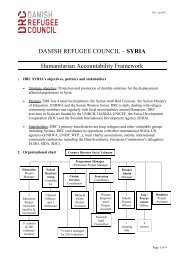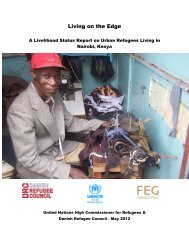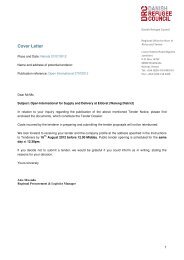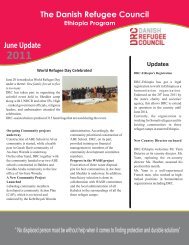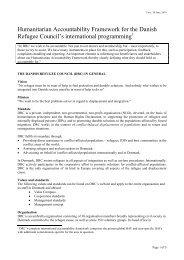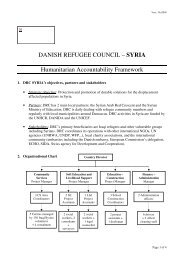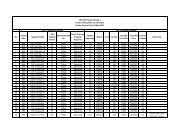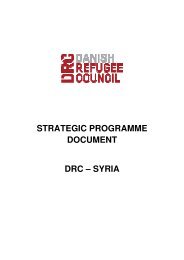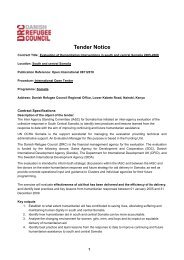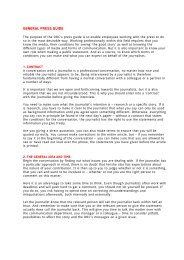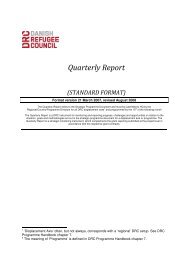Behind the Scenes, Kenya IDP Report - Danish Refugee Council
Behind the Scenes, Kenya IDP Report - Danish Refugee Council
Behind the Scenes, Kenya IDP Report - Danish Refugee Council
Create successful ePaper yourself
Turn your PDF publications into a flip-book with our unique Google optimized e-Paper software.
Chapter 1: Introductionby <strong>the</strong> MoSSP and <strong>the</strong> Legal and Advocacy Sub-Working Group (LASWG), a <strong>the</strong>me group under<strong>the</strong> PWGID. Meetings were hosted at <strong>the</strong> ministryon a weekly basis with a technical advisor from<strong>the</strong> office of <strong>the</strong> Special Rapporteur on <strong>the</strong> HumanRights of <strong>IDP</strong>s (SR-<strong>IDP</strong>s) providing technicalsupport to <strong>the</strong> team. In March 2010, partnersreviewed a preliminary draft for <strong>the</strong> policy during<strong>the</strong> second stakeholders’ forum.From May to December 2010, <strong>the</strong> LASWG developedand disseminated a matrix auditing <strong>the</strong> legal,policy and institutional framework in relation to<strong>the</strong> protection of <strong>IDP</strong>s. The matrix indicated <strong>the</strong>weaknesses in <strong>the</strong> existing framework and justified<strong>the</strong> need for a concrete legal framework andfor implementing <strong>the</strong> draft Policy. In November2010, <strong>the</strong> team amended <strong>the</strong> draft policy to reflect<strong>the</strong> provisions of <strong>the</strong> newly-promulgated <strong>Kenya</strong>nConstitution so that it correlated with <strong>the</strong> frameworkfor devolution, human rights, values andprinciples of governance under <strong>the</strong> Constitution.Fur<strong>the</strong>r revisions were made in July 2012 to make<strong>the</strong> draft Policy compatible with <strong>the</strong> Land Act(2012), <strong>the</strong> Land Registration Act (2012) and <strong>the</strong>National Land Commission Act (2012). On 16thMarch 2011, <strong>the</strong> group submitted a draft cabinetmemo to MoSSP to accompany <strong>the</strong> policy for itspresentation to cabinet.To fur<strong>the</strong>r entrench its advocacy work, <strong>the</strong> PW-GID had engagements with o<strong>the</strong>r stakeholders like<strong>the</strong> Parliamentary Select Committee on <strong>the</strong> Resettlementof <strong>IDP</strong>s (PSC) and <strong>the</strong> Labour and SocialWelfare Committee (LWSC), which resulted in<strong>the</strong> development of <strong>the</strong> Bill on internal displacement.The Prevention, Protection and Assistanceto Internally Displaced Persons Bill has alreadyreceived Presidential assent while <strong>the</strong> broaderpolicy document has been approved by <strong>the</strong> Cabinetand is awaiting presentation to Parliament fordebate. 41.3. Purpose and Objectivesof <strong>the</strong> StudyThe purpose of this study is to capture and analyse<strong>the</strong> advocacy and engagement process that wentinto <strong>the</strong> preparation of <strong>the</strong> <strong>IDP</strong> Policy and Bill in<strong>Kenya</strong>. By highlighting <strong>the</strong> challenges and lessonslearnt from <strong>the</strong> process, <strong>the</strong> outcome of this studyshould make a useful guide for discussions on advocacystrategies on forced migration policy at <strong>the</strong>national, regional and continental level.According to <strong>the</strong> Brookings Institution’s databaseon national laws and policies on internal displacement,only four countries in <strong>the</strong> Great Lakes regionhave developed an <strong>IDP</strong>-specific policy to deal withparticular protection needs. 5 The <strong>Kenya</strong>n experiencecould <strong>the</strong>refore inspire o<strong>the</strong>r countries within<strong>the</strong> region and beyond, especially as momentumbuilds up for <strong>the</strong> implementation of <strong>the</strong> GuidingPrinciples, <strong>the</strong> Kampala Convention and <strong>the</strong> GreatLakes <strong>IDP</strong> Protocol. Beyond its particular contexton internal displacement, lessons learnt from <strong>the</strong><strong>Kenya</strong>n process could also be useful for reflectingon policy development work in o<strong>the</strong>r sectors.1.4. The Partnership between<strong>the</strong> <strong>Refugee</strong> Consortium of<strong>Kenya</strong> and <strong>the</strong> <strong>Danish</strong> <strong>Refugee</strong><strong>Council</strong> (Great LakesCivil Society Project)The Great Lakes Civil Society Project is a regionalprogramme implemented since January 2010 by<strong>the</strong> <strong>Danish</strong> <strong>Refugee</strong> <strong>Council</strong> in partnership withcivil society organisations in six countries of <strong>the</strong>Great Lakes region: Burundi, Central African Republic,Democratic Republic of Congo, <strong>Kenya</strong>,South Sudan and Uganda. The vision of <strong>the</strong> programmeis to build <strong>the</strong> capacity of civil society tohold governments accountable to <strong>the</strong>ir commitmentsto protect displaced persons by proposingrealistic policy solutions to conflict and displacement.The programme supports national civil societyorganisations in documenting and analysingspecific displacement and conflict issues, andtranslating <strong>the</strong>se analyses into practical advocacygoals at <strong>the</strong> local, national and regional levels. Theproject relies on existing legal and political frameworksfor <strong>the</strong> protection of refugees and <strong>IDP</strong>s and,where possible, encourages cross-border learningbetween civil society organisations and regionalinitiatives aimed at providing joint solutions to regionaldisplacement problems.The <strong>Refugee</strong> Consortium of <strong>Kenya</strong> (RCK) is anational Non-Governmental Organisation thatworks to promote and protect <strong>the</strong> rights and dignityof refugees and o<strong>the</strong>r forced migrants. RCK wasconstituted and registered in 1998 in response to<strong>the</strong> increasingly complex refugee situation in <strong>Kenya</strong>.RCK is distinct in <strong>the</strong> role it plays in promoting<strong>the</strong> welfare and rights of refugees and o<strong>the</strong>r forcedmigrants. It focuses on refugee and <strong>IDP</strong> issues usinga human rights and social justice approach asit advocates for <strong>the</strong>ir rights. In partnership withits networks locally, regionally and internationally,RCK has been able to deal with a wide rangeof issues in forced migration. These include legalreforms, policy development, civic education, researchand information dissemination, refugeeand <strong>IDP</strong> empowerment and capacity building.Since 2010, RCK in partnership with DRC GreatLakes has been engaged in <strong>IDP</strong> work under threestrategic objectives for <strong>the</strong> year 2012: i) Lobbyingfor <strong>the</strong> enactment of <strong>the</strong> <strong>IDP</strong> Policy with differentduty bearers; ii) Creating awareness on <strong>the</strong> rightsand protection needs of <strong>IDP</strong>s in <strong>Kenya</strong>; and iii)Documenting <strong>the</strong> advocacy and engagement processtowards an <strong>IDP</strong> policy framework in <strong>Kenya</strong>.1.5. Methodology of <strong>the</strong> Study1.5.1. Desk ReviewThis study was informed by a review of a numberof secondary sources of information in <strong>the</strong> formof publications, reports, minutes, concept papers,as well as relevant national, regional and internationalframeworks on <strong>IDP</strong>s. This information wasused to build <strong>the</strong> context on <strong>IDP</strong> protection, identifygaps in existing protection and advocacy initiatives,identify <strong>the</strong> key stakeholders in <strong>IDP</strong> work,and establish benchmarks for protection and advocacywork.1.5.2. Key Informant InterviewsThe study made use of purposive sampling, interviewingvarious respondents from organisationsor institutions that have taken an active part in <strong>the</strong>policy development process. These respondentsincluded state and non-state actors and representedinternational, national and field-based level actors.The interviews were mainly conducted usingsemi-structured questionnaires as well as informaldiscussions.In total, 22 stakeholders were interviewed. 13 wererepresentatives of state institutions comprisingof four international (mainly UN Agencies), sixnational (from relevant ministries, <strong>Kenya</strong> NationalCommission on Human Rights – KNCHR,and Parliament) and three field-based ProtectionWorking Group members (mainly from <strong>the</strong> ProvincialAdministration in Nakuru and Eldoret).Nine non-state actors were also interviewed: twointernational non-governmental organisations,four national actors and three members from <strong>the</strong><strong>IDP</strong> Network. Informal reflections were also undertakenwith members of <strong>the</strong> Eldoret field-basedProtection Working Group on 26 st July 2012.1.5.3. Internal RCK ReflectionWhile <strong>the</strong> consultants who conducted this studycarried out interviews with <strong>the</strong> relevant stakeholdersin an attempt to re-enact and re-examine<strong>the</strong> policy development process, <strong>the</strong>y also reliedon information accumulated by RCK from its ownadvocacy work. RCK has played a significant rolein <strong>the</strong> development of <strong>the</strong> policy framework oninternal displacement in <strong>Kenya</strong>. Initial efforts inthis respect have included preliminary discussionswith actors around <strong>the</strong> prospect of developing an<strong>IDP</strong> Policy. After <strong>the</strong> post-election violence, <strong>the</strong>role of RCK became more concrete with <strong>the</strong> inceptionof <strong>the</strong> Protection Working Group on InternalDisplacement and of <strong>the</strong> legal and advocacy subgroupfor longer-term interventions such as policydevelopment, promotion of access to durable solutionsand ensuring a holistic approach to internaldisplacement in <strong>Kenya</strong>. The specific role of RCK2<strong>Behind</strong> <strong>the</strong> <strong>Scenes</strong> – Lessons Learnt from Developing a National Policy Framework on Internal Displacement in <strong>Kenya</strong> 3



